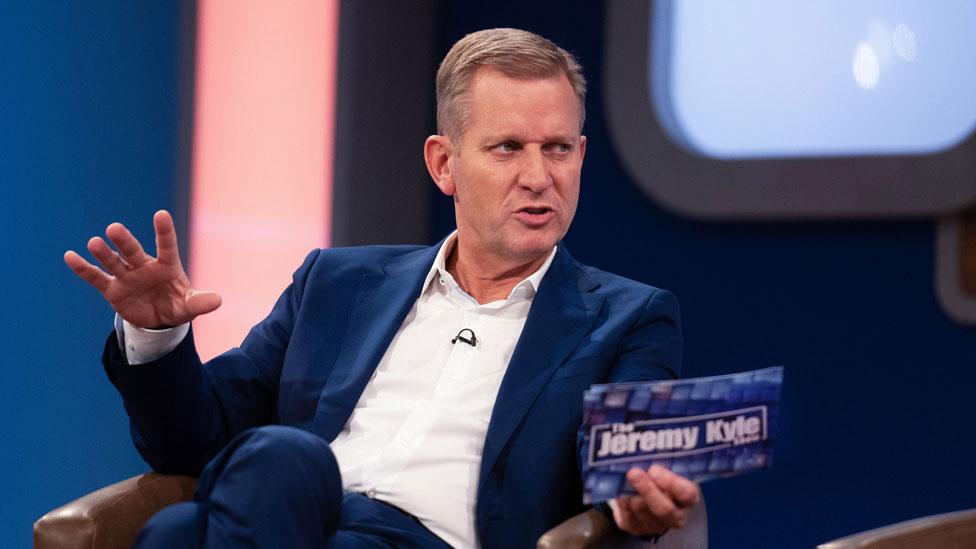TV industry under the microscope after Jeremy Kyle Show cancellation
- Published

Jeremy Kyle at MediaCityUK in Salford, where his show was filmed
The welfare of guests on TV shows is to be scrutinised by MPs and regulators in the wake of the death of a man who appeared on The Jeremy Kyle Show.
ITV has cancelled the daytime programme following the death of Steve Dymond.
The Commons media select committee is to investigate whether TV companies give guests enough support and media regulator Ofcom is examining whether to update its code of conduct.
Mr Kyle told the Sun he was "utterly devastated by the recent events", external.
In a statement he said: "Myself and the production team I have worked with for the last 14 years are all utterly devastated by the recent events.
"Our thoughts and sympathies are with Steve's family and friends at this incredibly sad time."
Ex-Jeremy Kyle guest Danny Fuller: "You've been used and abused and that's it"
Mr Dymond was found dead on 9 May, a week after filming the show, during which he took a lie detector test.
Ofcom has told ITV to report back the initial findings from its investigation into Mr Dymond's participation in programme by Monday.
"While ITV has decided to cancel the programme, its investigation into what happened is continuing and we will review the findings carefully," the Ofcom spokesperson said.
ITV announced on Wednesday that The Jeremy Kyle Show had been axed permanently. Chief executive Carolyn McCall said the decision was a result of the "gravity of recent events".
She said: "The Jeremy Kyle Show has had a loyal audience and has been made by a dedicated production team for 14 years, but now is the right time for the show to end."
There are now questions about how participants are looked after across the TV industry. Love Island, another ITV show, has also come under scrutiny after the deaths of two former contestants.
Former Love Island contestant Zara Holland on what it's like inside the villa
Damian Collins MP, chair of the digital, culture, media and sport select committee, said: "There needs to be an independent review of the duty of care TV companies have to participants in reality TV shows.
"Programmes like The Jeremy Kyle Show risk putting people who might be vulnerable on to a public stage at a point in their lives when they are unable to foresee the consequences, either for themselves or their families.
"With an increasing demand for this type of programming, we'll be examining broadcasting regulation in this area - is it fit for purpose?"
Jeremy Kyle Show: Audience member recalls Steven Dymond episode
The committee will scrutinise the psychological support provided to participants and ask who should be responsible for monitoring whether duty of care policies are being effectively applied.
It will also look at whether shows put pressure on participants to exhibit "more extreme behaviour".
Ofcom said it was "vital" that people taking part in reality and factual shows were properly looked after, and its broadcasting code of conduct could include new protections for them.
"We're examining whether more can be done to safeguard the welfare of those people, similar to the duty of care we have in the broadcasting code to protect under-18s," a spokesperson said.

If you are feeling emotionally distressed and would like details of organisations in the UK which offer advice and support, go to bbc.co.uk/actionline.
- Published15 May 2019

- Published15 May 2019

- Published15 May 2019